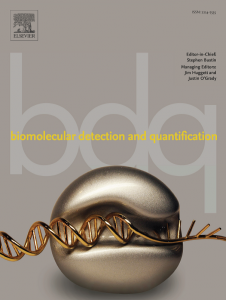Elsevier’s Biomolecular Detection and Quantification (BDQ) journal is a new open access, peer-reviewed international journal focused on the application of qualitative and quantitative molecular methodologies to all areas of clinical and life sciences.
“If we look at the general literature and we look at people’s comments, there is a long record of people saying that we (the research community) need to get our act together in terms of getting our experiments done properly, reported properly and that our conclusions need to be supported by our data.” Stephen Bustin, Professor of Molecular Medicine, Postgraduate Medical institute, Faculty of Medical Science, Anglia Ruskin University and Editor-in-Chief BDQ Biomolecular Detection and Quantification Journal
Two main aims of the journal are: to provide a forum for discussion and recommendation of guidelines designed to improve the accuracy of molecular measurement, its data analysis and the transparency of its subsequent reporting; to publish molecular biology based studies that adhere to best practice guidelines, both current and future.
“It’s all about making sure we are producing good, reproducible science using good methods and encouraging the community to produce and report their science accurately.” Justin O’ Grady, Lecturer in Medical Microbiology, University of East Anglia and Managing Editor of the BDQ Biomolecular Detection and Quantification Journal.
BDQ was established by a group of scientists based on their experience developing and publishing the Minimum Information for Publication of Quantitative Real-Time (and Digital) PCR Experiments (the MIQE and digital MIQE guidelines).
The scope of the journal is broad: genetics, epigenetics, transcriptomics, proteomics, cancer, metabolomics, diagnostics etc. It also covers non clinical subjects including environmental, microbiology and food science. All submitted manuscripts must present original contributions and contain no data that have been published elsewhere. BDQ operates with a so-called double blind peer-review policy which means that both the author and the reviewer remain anonymous to each other to avoid reviewer bias. BDQ is edited by Stephen Bustin, Professor of Molecular Medicine, Postgraduate Medical Institute, Faculty of Medical Science, Anglia Ruskin University, UK. It is distinguished by its three highly respected founding editors and molecular methodology pioneers Carl Wittwer, Michael W. Pfaffl and Ron Cook, and an international editorial board comprised of experienced scientists with broad expert interest.
“The Journal is growing. We had our first issue in September, so we’ve been going for just over six months. We had ten articles published so far and there’s another ten or so going to come out next month… so it’s building and strengthening all the time. We have good support from the Publisher Elsevier and we hope that, within six months or so, we will be listed on PubMed and then, within three years of the journal starting, we will get our first recorded Impact Factor (IF), which we hope should be pretty good.” Justin O’ Grady, Lecturer in Medical Microbiology, University of East Anglia and Managing Editor of the BDQ Biomolecular Detection and Quantification Journal.
The journal welcomes submissions from younger scholars and researchers and those from developing countries. It proudly sponsored the “BDQ Young Scientist Poster Awards” at the qPCR & NGS 2015 Symposium in Freising-Weihenstephan, Germany 25th March 2015.
By Tea Pavlek, BioSistemika LLC and Frauke M. Muenzel, Elsevier











